 MyCatBreeds
MyCatBreeds Both Domestic Shorthaired Cat and American Bobtail are originated from United States. Both Domestic Shorthaired Cat and American Bobtail are having almost same weight. Both Domestic Shorthaired Cat and American Bobtail has same life span. Both Domestic Shorthaired Cat and American Bobtail has same litter size. Domestic Shorthaired Cat requires Low maintenance. But American Bobtail requires Moderate maintenance
Both Domestic Shorthaired Cat and American Bobtail are originated from United States. Both Domestic Shorthaired Cat and American Bobtail are having almost same weight. Both Domestic Shorthaired Cat and American Bobtail has same life span. Both Domestic Shorthaired Cat and American Bobtail has same litter size. Domestic Shorthaired Cat requires Low maintenance. But American Bobtail requires Moderate maintenance
 The Domestic short-haired cat has also got mixed ancestry and can have lots of different looks. In the UK they are often referred to as Moggie.
The Domestic short-haired cat has also got mixed ancestry and can have lots of different looks. In the UK they are often referred to as Moggie.
It is one of the most common cats in the United States. The roots of this cat go back to the pioneer settlement in North America where they were thought of as working cats. Nobody seems clear on where they originated from.
Hardy and unaffected, they quickly became a sought after cat that stood up well to all kinds of conditions. Even though this cat is a non-pedigreed cat, it is accepted by the Cat Fanciers' Association (CFA) in the Household Pets category.
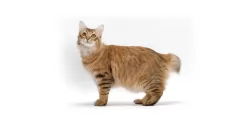 Bobtailed cats have a naturally shortened tail due to natural genetic mutation. The cat’s original appearance genetics were modified so as to bring about an improved strain that comes in all colors and coat types.
Bobtailed cats have a naturally shortened tail due to natural genetic mutation. The cat’s original appearance genetics were modified so as to bring about an improved strain that comes in all colors and coat types.
The cat descended from a short-tailed kitten, Yodi. His kittens also had a short tail. Two women selectively bred the cats to be large and strong with a wild look but with a pleasant nature.
The cats used in the development of the breed were domestic shorthairs and longhairs. They are now pedigreed cats without tails.
In 1989, the International Cat Association accepted the American Bobtail into its new breed category, giving it full recognition in 2002. They were accepted for registration by the Cat Fanciers’ Association in 2000. This is the world's biggest registry of pedigreed cats.
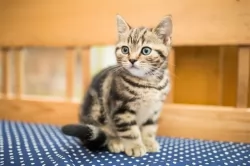 The Domestic short-haired cats can be so many things – different coat colors and different patterns as well as being different shapes and sizes.
The Domestic short-haired cats can be so many things – different coat colors and different patterns as well as being different shapes and sizes.
They can all have different shaped eyes and colors and their ears and tails can differ from cat to cat. The reason for this is that these cats don’t belong to a specific breed.
It has a mixed ancestral history. The Domestic Shorthaired varies in colors and size and their coats can be any color, solid or patterned. The length of the coat is short and is silky and shiny.
It’s a low shedding cat and grooming will be easy. Every cat has its own physical characteristics, and some can have a slight build while others are heavier built and more muscular.
You could find their eyes can be different colors too – blue, green, copper or brown.
Just like the Domestic Shorthair has lots of different looks, the temperament too varies. There is no set standard for these cats and when you choose a kitten, you can’t really be sure how they will turn out.
Your cat may be quiet, very vocal, active, placid, loyal loving, independent, playful or lazy – who knows with these wonderful cats?
Certainly, most of them are friendly, loving and loyal. They make wonderful pets for new cat owners, singles, couples, families and seniors.
People love them as they aren’t high maintenance pets – they are undemanding.
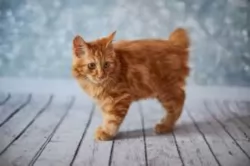 The American Bobtail is a cat that came about in the 1960s. It is well know as the cat with a bobbed tail. It’s not as vocal as many other cat breeds. It’s not a slender cat but is sturdy and and strong weighing between 3 and 7kg. Their double coats can be short- or long-haired. The coat comes in different patterns and colors, including orange, cream, black, brown, chocolate etc with a shaggy texture. He sheds quite a bit. The body of the American Bobtail is faily long. Its ears are medium-sized and wide-based with rounded tips, the eyes are almond shape. The eyes can be gold, yellow, green or blue. What is interesting is that the hind legs are much longer than the fore legs, and the feet are round.
The American Bobtail is a cat that came about in the 1960s. It is well know as the cat with a bobbed tail. It’s not as vocal as many other cat breeds. It’s not a slender cat but is sturdy and and strong weighing between 3 and 7kg. Their double coats can be short- or long-haired. The coat comes in different patterns and colors, including orange, cream, black, brown, chocolate etc with a shaggy texture. He sheds quite a bit. The body of the American Bobtail is faily long. Its ears are medium-sized and wide-based with rounded tips, the eyes are almond shape. The eyes can be gold, yellow, green or blue. What is interesting is that the hind legs are much longer than the fore legs, and the feet are round.
Bobtails are friendly cats, enjoying being in the company of their human family as well as with strangers. They are loving and affectionate to the entire family as opposed to just one person.
They’re quiet cats but will chirp when happy and excited. They get on well with all members of their human family and that includes children and the dogs.
They’re intelligent cats too and they can be taught to walk on a leash and to also perform some tricks. There are some people who say that their Bobtails act more like dogs than cats. These cats are sensitive and can sense when their owners are happy or sad and will come and sit with you when you're feeling sad and alone.
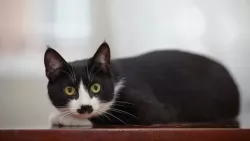 As we’ve already suggested, the Domestic Shorthaired has an easy-going personality, not demanding much from you except nutritious food and lots of love and attention.
As we’ve already suggested, the Domestic Shorthaired has an easy-going personality, not demanding much from you except nutritious food and lots of love and attention.
It’s important to provide your cat with a lifestyle that keeps him happy and content.
Rather than buy your pets lots of expensive cat accessories, your cat will be happier to do with less but to have more attention from you. This cat is willing to give you so much love and companionship ad he asks the same from you.
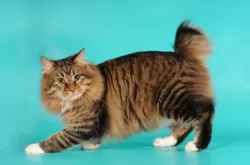 Many people want a dog as a pet but aren’t able to keep one and then the American Bobtail becomes the ideal alternative. These cats aren’t known for their solitary personalities like the many other cats there are and they genuinely love to spend time with their human family. Some will even behave like a dog and be there to meet you at the door when you arrive home.
Many people want a dog as a pet but aren’t able to keep one and then the American Bobtail becomes the ideal alternative. These cats aren’t known for their solitary personalities like the many other cats there are and they genuinely love to spend time with their human family. Some will even behave like a dog and be there to meet you at the door when you arrive home.
He is a fairly large, amicable cat and is affectionate and adaptable to your lifestyle. He enjoys all kinds of lifestyles and loves to curl up next to you on your travels, being the perfect road trip companion.
The American Bobtail is a therapeutic cat and is sensitive to the moods of its human family. He gets on well with children and other pets in the family and just wants to be a family member.
By bringing an American Bobtail into your home and your heart, you’ll have discovered the most wonderful feline companion there is.
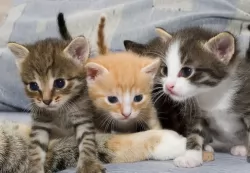 Because of their mixed breed, these Domestic Shorthaired cats don’t sicken easily and they are healthy cats and robust – less vulnerable to the genetic problems that plague purebred cats.
Because of their mixed breed, these Domestic Shorthaired cats don’t sicken easily and they are healthy cats and robust – less vulnerable to the genetic problems that plague purebred cats.
Nonetheless, he can succumb to illness and then you need to get him to the vet immediately. There are come cat illnesses that can kill your cat in just a few hours. Look at bloat as an example – this is when your cat’s stomach becomes swollen and your pet is weak and vomiting. It’s a life-threatening condition that can kill your cat in half an hour,
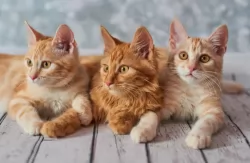 When you buy a kitten from a breeder, always do research on the breeder so as to avoid a host of health issues down the line.
When you buy a kitten from a breeder, always do research on the breeder so as to avoid a host of health issues down the line.
Apart from the typical cat health problems, the Bobtail is a healthy breed of cat. With proper care from you at home as well as veterinary care, these interesting looking cats can live up to anything between 12 and 20 years.
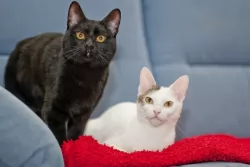 Just like you prepare for a human baby’s arrival, prepare for your Domestic Shorthaired’ arrival.
Just like you prepare for a human baby’s arrival, prepare for your Domestic Shorthaired’ arrival.
Have food and water bowls, a nice, dry, warm bed, toys to stimulate mind and body, litter box, scratching post, climbing tree and collar.
Have your cat neutered or spayed. This is to avoid unwanted kittens. You’ll often see these cats in animal shelters and you don’t want to add to the burden of these shelters. By neutering and spaying your cat, they behave in a better way. They are far less likely to want to roam away from home as well. A cat that have been neutered or spayed also enjoys a host of health benefits, and this common surgical operation is highly recommended.
Food for your cat is very important for good health. Do research and you’ll discover how imperative good gut-health is. A poor diet and the wrong diet can cause your cat to battle with a lot of poor health issues and digestive problems.
You’ll end up spending a fortune on your cat’s vet bills. A cat is a carnivore and it is most important to feed your cat meat. Check out the labels on the cat’s commercially manufactured food and choose the ones that make meat a top ingredient.
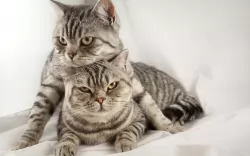 Keep a close eye on your cat’s weight.
Keep a close eye on your cat’s weight.
Keep the litter box of your Bobtail scrupulously clean.
Your American Bobtail needs the best quality food there is full of vitamins and minerals if he is to remain healthy. The cat’s diet will depend a lot on his activity levels and general health, but it should always be high protein food. Your vet will always help you with some guidelines on feeding your cat.
Every cat needs exercise, and even though these cats aren’t as energetic as other cats, they are active indoors and out and are also playful. You will need to provide it with some puzzle toys and a climbing tree to keep him mentally and physically active.
Brush his medium-length fur twice a week to keep it shiny and silky.
Trim his nails carefully and check his eyes and inside his ears for abnormal discharges.
Vaccinate your cat to keep it protected from life-threatening cat diseases and take him to the vet immediately you suspect something is wrong.